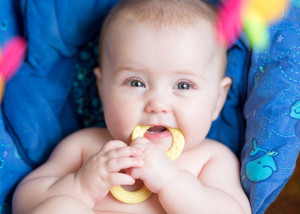
Teething and sleep don’t mix… right? Or do they? If your baby or toddler has disrupted sleep you may be tempted to blame teething – and you may be right. There’s no question that for some babies, teething involves discomfort. But studies suggest that teething may not be the huge sleep wrecker that parents assume it to be – and many of the common symptoms that parents blame on teething may actually have nothing to do with those emerging pearly whites. Studies on teething have yet to find a causal relationship between any specific cluster of symptoms and the emergence of teeth. Symptoms like drooling, gum rubbing, fussiness, decreased appetite for solids, mild temperature increases and wakefulness can sometimes be associated with the eruption of teeth but congestion, high fever, loose stools, cough, body rashes and decreased interest in liquids are not. Studies do suggest that teething related symptoms appear for a few days prior to the tooth’s eruption, and for a few days afterwards. That means that if your child has symptoms for more than a few days and a tooth doesn’t appear it’s unlikely that teething is the problem.
Read the full article on teething and sleep here.

No comments yet.